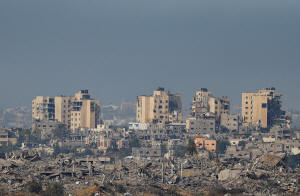|
The
foreign ministers of Saudi Arabia, Egypt and Jordan told a media
briefing in London that the agreement, which includes hostage
releases and stepped-up aid into the devastated Gaza Strip,
should also ultimately lead to a resumption of talks for a
two-state solution.
Under Wednesday's temporary ceasefire deal, Israel and Hamas
agreed to a four-day pause in fighting to allow the release of
50 hostages held in Gaza in exchange for 150 Palestinians
imprisoned in Israel, and the entry of humanitarian aid into the
enclave.
Saudi Foreign Minister Prince Faisal bin Farhan Al Saud said the
humanitarian aid should be sustained and expanded, and it should
not later become contingent on further hostage releases.
"Whatever humanitarian access now increases as a result of this
hostage deal must remain in place and must be built upon," he
said.
"There must at no point be a reduction in this access based on
progress for further release of hostages ... Punishing the
civilian population of Gaza for the holding of those hostages is
absolutely not acceptable."
The conflict began on Oct. 7 when Hamas gunmen and other
militants burst across the border into Israel, killing 1,200
civilians and Israeli soldiers, and taking about 240 hostages.
Israel responded with a heavy bombardment and then invasion of
the Gaza Strip, killing more than 13,000 Palestinians, including
at least 5,600 children, according to Gaza’s Hamas-run
government.
The Arab foreign ministers are leading a so-called contact group
of mostly Muslim countries which are lobbying Israel's major
allies and the U.N. Security Council to bring about an end to
the Gaza war and move towards a permanent solution to the
Israel-Palestinian conflict.
(Reporting by Mark Bendeich and Aidan Lewis; Editing by Nadine
Awadalla and Michael Georgy)
[© 2023 Thomson Reuters. All rights
reserved.] Copyright 2022 Reuters. All rights reserved. This material may not be published,
broadcast, rewritten or redistributed.
Thompson Reuters is solely responsible for this content.

|
|




